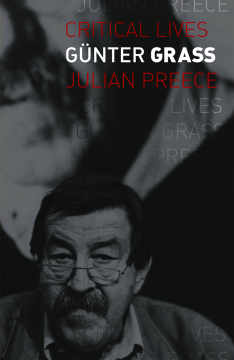
Additional Information
Book Details
Abstract
Günter Grass was Germany’s foremost writer for more than half a century, and his books were and remain best-sellers across the world. The Tin Drum was made into an Oscar-winning film in 1979, and the memoir Peeling the Onion astounded readers by revealing Grass had been drafted into the military wing of the SS, a ruthless component of the Nazi war machine, in the closing months of World War II. Grass also wrote memorably about the German student movement, feminism, and German reunification, and was a key influence on magical realist authors such as Gabriel García Márquez and Salman Rushdie, as well as on the popular novelist John Irving.
Günter Grass is the first biography in English of this Nobel Prize–winning writer. Julian Preece introduces both Grass’s key works and political activities, chronicling his interaction with major figures from literary and public life like holocaust poet Paul Celan, Chancellor Helmut Kohl, and cofounder of the Red Army Faction Ulrike Meinhof. From Grass’s campaigning as a citizen for the anti-Nazi resistor and Social Democrat leader Willy Brandt to his more recent invectives against free-market capitalism, Preece places Grass’s fiction and public work in the context of Cold War European politics and post-unification Germany, painting an indelible portrait of a writer who reinvented the postwar German novel and redefined the role of literary commitment.
"An ambitious, brief study which charts the life together with reference to the work. We learn of Grass’s early training as a stonemason and sculptor, and how his adored mother Helene, a Catholic Cassubian, encouraged his reading. His father was Lutheran, and that mixed heritage, Preece contends, influenced the range of Grass’s fictional characters. Preece makes several references to his subject’s defining love of food and sex. But it is the wealth of political material, much of it involving Grass’s relationship with the former German chancellor Willy Brandt, Grass’s political ambitions and hunger for publicity, which dominate the narrative. Politics soon emerges as the major theme; that and Grass’s divided personality as a polemical artist with political aspirations. . . . The general reader will find this quasi-conversational analysis a useful introduction to one of world literature’s most exciting writers."
— Times Literary Supplement
"Reaktion's Critical Lives series makes available for English readers high-quality biography and critical analysis of major figures from Antonin Artaud to Frank Lloyd Wright. The Günter Grass contribution is intelligent, readable, and comprehensive—the resource nonspecialists will go to. One can escape without knowing any German—witness that in the text, the titles of Grass's works are given only in English. (The excellent bibliography, however, does have many German sources for the benefit of readers who wish to go deeper.) What is particularly useful in the Reaktion format is the quality of historical background and context. Preece places Grass in the post–World War II environment of what the Germans call Vergangenheitsbewältigung: i.e., dealing with the Nazi past. Grass was both a literary and a political figure in Cold War Germany. His friendships with German Chancellors Willy Brandt and Gerhard Schroeder were an important part of his world. The discussion of The Tin Drum in both novel and cinematic forms is particularly helpful. Preece places The Tin Drum alongside Goethe's Werther and Mann's Buddenbrooks as the greatest first novels in the German language. Recommended."
— Choice
"This highly readable little book is a must for any student or lay reader who wishes to gain an overview of Günter Grass’s life and work, but it also contains gems for those more familiar with his texts and times. . . . Particularly impressive across all eight chapters is Preece’s ability to keep the whole, complex oeuvre in view, as he moves lightly from one text to another without losing the overall thread of his argument in each chapter. . . . This book will be on my prescribed reading list for years to come. I thoroughly recommend it to anyone looking to gain a clear sense of why they should read Günter Grass."
— Journal of European Studies
Julian Preece is professor of German studies at Swansea University. He has written for the Guardian, Literary Review, and Times Literary Supplement. He is the author or editor of many books, including The Life and Work of Günter Grass: Literature, History, Politics and Baader-Meinhof and the Novel: Narratives of the Nation, Fantasies of the Revolution.
Table of Contents
| Section Title | Page | Action | Price |
|---|---|---|---|
| Cover | Cover | ||
| Title Page | 3 | ||
| Imprint Page | 4 | ||
| Contents | 5 | ||
| Prologue: Many-sided Man | 7 | ||
| 1. From Danzig to Paris, 1927–59: Living The Tin Drum | 17 | ||
| 2. Art and Violence in the Early Fiction | 53 | ||
| 3. Public Uses of Fame: Willy Brandt and the SPD | 77 | ||
| 4. Back to the Future, Forward to the Past | 99 | ||
| 5. Crying Wolf in ‘Orwell’s Decade’? | 122 | ||
| 6. Learning to Love the Berlin Republic: Too Far Afield | 144 | ||
| 7. The New Nation Is Me | 158 | ||
| 8. The Culmination of Project Self | 173 | ||
| Epilogue: Poetry and Death | 194 | ||
| References | 198 | ||
| Select Bibliography | 214 | ||
| Acknowledgements | 221 | ||
| Photo Acknowledgements | 222 |
